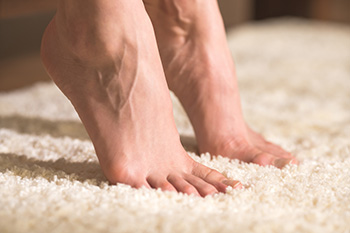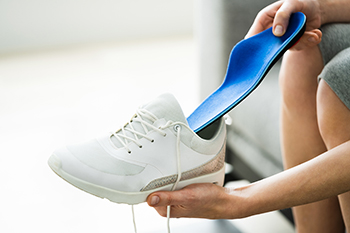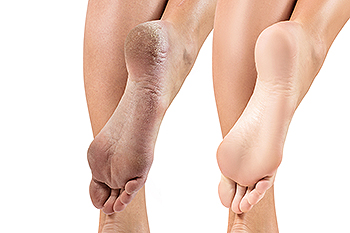March 2023
Working Out With Broken Feet

When someone breaks or fractures their feet, it can significantly limit their motion and mobility. Therefore, many patients often wonder how they can perform daily exercise routines while suffering from a broken foot. It is important to always listen to the advice of your trusted medical professional, such as a podiatrist, who can tell you what activities are still permissible. For example, your podiatrist might tell you that if your condition is not too severe, swimming might be a permissible activity to engage in. Also, your podiatrist might inform you that core-strengthening exercises that do not put pressure on your feet can still be performed. If you have a broken foot and want to learn more about your exercise options, it is suggested that you schedule an appointment with a podiatrist today.
Exercising your feet regularly with the proper foot wear is a great way to prevent injuries and build strength. If you have any concerns about your feet, contact Dr. Anna Petrov from Family Foot & Ankle Care. Our doctor can provide the care you need to keep you pain-free and on your feet.
Exercise for Your Feet
Exercise for your feet can help you gain strength, mobility and flexibility in your feet. They say that strengthening your feet can be just as rewarding as strengthening another part of the body. Your feet are very important, and we often forget about them in our daily tasks. But it is because of our feet that are we able to get going and do what we need to. For those of us fortunate enough to not have any foot problems, it is an important gesture to take care of them to ensure good health in the long run.
Some foot health exercises can include ankle pumps, tip-toeing, toe rises, lifting off the floor doing reps and sets, and flexing the toes. It is best to speak with Our doctor to determine an appropriate regimen for your needs. Everyone’s needs and bodies are different, and the activities required to maintain strength in the feet vary from individual to individual.
Once you get into a routine of doing regular exercise, you may notice a difference in your feet and how strong they may become.
If you have any questions please feel free to contact one of our offices located in Wheeling and Chicago, IL . We offer the newest diagnostic and treatment technologies for all your foot and ankle needs.
Types of Orthotics

Many people wear orthotics as part of a treatment plan for specific foot conditions. They may be helpful in providing support to the ankle, and in possibly correcting foot deformities. They are defined as customized heel or foot inserts that are designed to fit the feet, based on the individual’s needs. Existing foot conditions that may benefit from wearing orthotics can include arthritis, bunions, diabetes, and flat feet. The materials orthotics are made from can range from rigid to flexible, and the choice is made depending on what the foot condition is. The effectiveness of wearing orthotics is based on how often they are worn, what kind of shoe they are going in, and how well they are made. If you are interested in learning more about wearing orthotics, it is suggested that you consult a podiatrist who can determine which type is best for you.
If you are having discomfort in your feet and would like to try orthotics, contact Dr. Anna Petrov from Family Foot & Ankle Care. Our doctor can provide the care you need to keep you pain-free and on your feet.
What Are Orthotics?
Orthotics are inserts you can place into your shoes to help with a variety of foot problems such as flat feet or foot pain. Orthotics provide relief and comfort for minor foot and heel pain but can’t correct serious biomechanical problems in your feet.
Over-the-Counter Inserts
Orthotics come in a wide variety of over-the-counter inserts that are used to treat foot pain, heel pain, and minor problems. For example, arch supports can be inserted into your shoes to help correct overarched or flat feet, while gel insoles are often used because they provide comfort and relief from foot and heel pain by alleviating pressure.
Prescription Orthotics
If over-the-counter inserts don’t work for you or if you have a more severe foot concern, it is possible to have your podiatrist prescribe custom orthotics. These high-quality inserts are designed to treat problems such as abnormal motion, plantar fasciitis, and severe forms of heel pain. They can even be used to help patients suffering from diabetes by treating foot ulcers and painful calluses and are usually molded to your feet individually, which allows them to provide full support and comfort.
If you are experiencing minor to severe foot or heel pain, it’s recommended to speak with your podiatrist about the possibilities of using orthotics. A podiatrist can determine which type of orthotic is right for you and allow you to take the first steps towards being pain-free.
If you have any questions please contact one of our offices located in Wheeling and Chicago, IL . We offer the newest diagnostic and treatment technologies for all your foot and ankle needs.
Why Are My Heels Cracked?

Many people do not take proper care of their feet during the colder months and a condition known as cracked heels may develop. The leading cause of cracked heels during the colder months is due to dry skin. Cracked heels can also arise from standing on hard surfaces for most of the day as well as wearing shoes with an open back. The aging process may also affect cracked heels because of the loss of skin elasticity. Existing medical conditions like eczema, psoriasis, athlete’s foot, and diabetes may lead to cracked heels. Deep cracks are called fissures and they may bleed and become infected. Additionally, people who are overweight may be prone to developing cracked heels, which adds extra pressure to the heels. If you suffer from cracked heels, it is suggested that you speak with a podiatrist who can prescribe medication for complete relief.
If the skin on your feet starts to crack, you may want to see a podiatrist to find treatment. If you have any concerns, contact Dr. Anna Petrov from Family Foot & Ankle Care. Our doctor can provide the care you need to keep you pain-free and on your feet.
Cracked Heels
It is important to moisturize your cracked heels in order to prevent pain, bleeding, and infection. The reason cracked heels form is because the skin on the foot is too dry to support the immense pressure placed on them. When the foot expands, the dry skin on the foot begins to split.
Ways to Help Heal Them
- Invest in a good foot cream
- Try Using Petroleum Jelly
- Ease up on Soaps
- Drink Plenty of Water
Ways to Prevent Cracked Heels
- Moisturize After Showering
- Skip a Shower
- Keep Shower Water Lukewarm
- Don’t Scrub Your Feet
If you are unsure how to proceed in treating cracked heels, seek guidance from a podiatrist. Your doctor will help you with any questions or information you may need.
If you have any questions, please feel free to contact one of our offices located in Wheeling and Chicago, IL . We offer the newest diagnostic and treatment technologies for all your foot care needs.
Treatment of Foot Ulcers

A foot ulcer is any open sore on the foot. Such a sore may be on the surface of the skin or extend down to the tendons and bones. While commonly associated with diabetes, foot ulcers can arise from other various sources. Those with poor circulation, abnormalities in the bones or muscles of the feet, and skin cancer can develop foot ulcers that can become infected, are difficult to heal, and can have serious consequences for one’s health. An untreated infection can turn into an abscess or pocket of pus, cellulitis, a bone infection, or gangrene. It is suggested that you examine your feet daily and see a podiatrist as soon as possible if you notice an open sore on your foot.
Wound care is an important part in dealing with diabetes. If you have diabetes and a foot wound or would like more information about wound care for diabetics, consult with Dr. Anna Petrov from Family Foot & Ankle Care. Our doctor will assess your condition and provide you with quality foot and ankle treatment.
What Is Wound Care?
Wound care is the practice of taking proper care of a wound. This can range from the smallest to the largest of wounds. While everyone can benefit from proper wound care, it is much more important for diabetics. Diabetics often suffer from poor blood circulation which causes wounds to heal much slower than they would in a non-diabetic.
What Is the Importance of Wound Care?
While it may not seem apparent with small ulcers on the foot, for diabetics, any size ulcer can become infected. Diabetics often also suffer from neuropathy, or nerve loss. This means they might not even feel when they have an ulcer on their foot. If the wound becomes severely infected, amputation may be necessary. Therefore, it is of the upmost importance to properly care for any and all foot wounds.
How to Care for Wounds
The best way to care for foot wounds is to prevent them. For diabetics, this means daily inspections of the feet for any signs of abnormalities or ulcers. It is also recommended to see a podiatrist several times a year for a foot inspection. If you do have an ulcer, run the wound under water to clear dirt from the wound; then apply antibiotic ointment to the wound and cover with a bandage. Bandages should be changed daily and keeping pressure off the wound is smart. It is advised to see a podiatrist, who can keep an eye on it.
If you have any questions, please feel free to contact one of our offices located in Wheeling and Chicago, IL . We offer the newest diagnostic and treatment technologies for all your foot care needs.








